Items
Subject is exactly
Economy
-
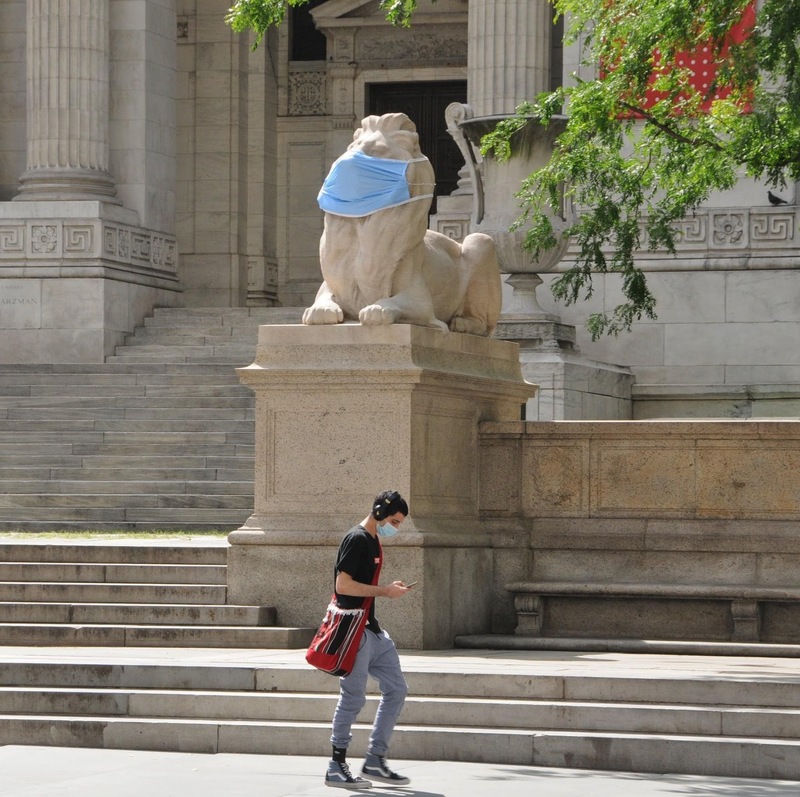 2020-07-27
2020-07-27Patience and Fortitude
The New York Public Library’s website explains, “During the 1930s, Mayor Fiorello LaGuardia named [the library lions] Patience and Fortitude for the qualities New Yorkers would need to survive the economic depression.” I remembered this fact and connected immediately with it the first time I saw Patience and Fortitude wearing their masks in solidarity with the New Yorkers they have watched over for more than a century. It struck me that we would need those virtues to make it through COVID-19 as well. “Those lion statues have seen New York struggle through and overcome many hardships from the 1917 Flu to the Great Depression to September 11th,” I thought. Things were grim in New York in 2020. We were the first to experience the horror that would eventually engulf the whole country. The infection rate was high, hospitals were full, people were dying. It was easy to despair. The masked lions were a powerful symbol of the resolve and resilience of New Yorkers and a reminder that this turmoil, too, would pass into history and the city - like the lions - would remain standing. -
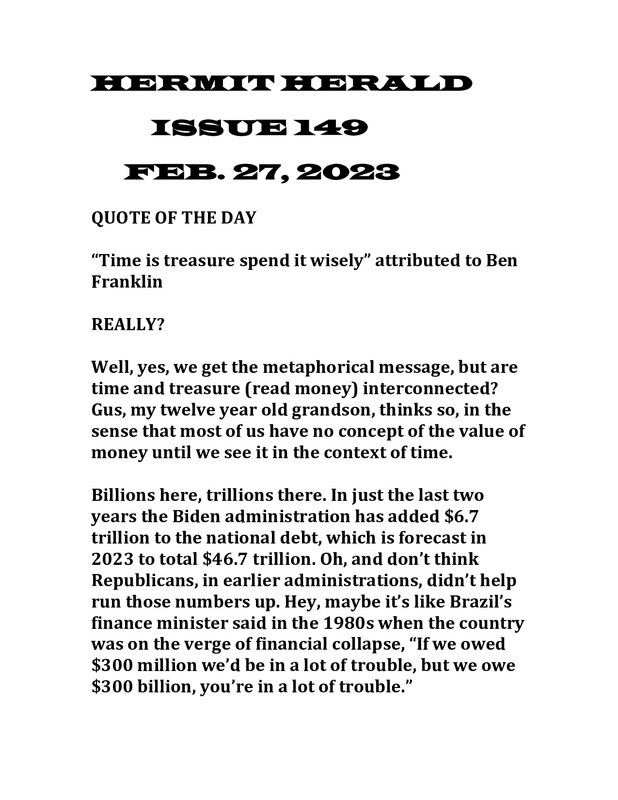 2023-02-27
2023-02-27HERMIT HERALD, ISSUE 149
what is a trillion -
 2022-08-19
2022-08-19HERMIT HERALD, ISSUE 144
TRUTH AND LIBERTY SUBJECTIVE -
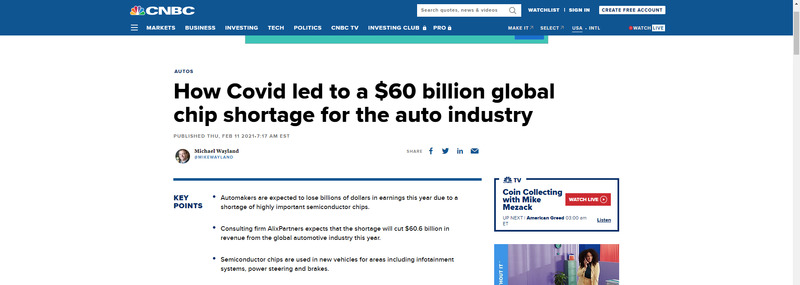 2021-02-11
2021-02-11How COVID led to a $60 billion global chip shortage for the auto industry
Article goes over the auto industry being affected by the pandemic. These kind of levels of economic interconnectivity really were exposed during the pandemic. -
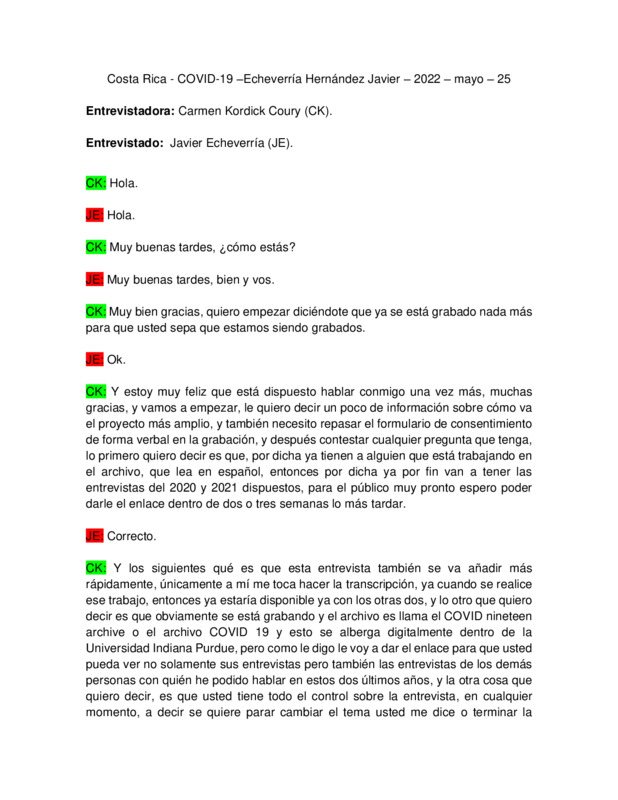 05/25/2022
05/25/2022Javier Echeverria Hernández Oral History, 2022/05/25
En esta entrevista Javier Hernández Echeverria es entrevistado por Carmen Kordick Coury concerniente al covid-19 en Costa Rica. Para empezar, hablan de los cambios que habían pasado desde el año anterior. Hablan de la situación en cuenta la pandemia y el programa de la vacunación. Hablan de la gente que aun no se han vacunado por falta de querer. Habla del camino a la normalidad, el uso de mascarillas, del gobierno, y nuevos candidatos. De allí hablan de su vida social, y el concierto de Cold Play. De La Caja, las elecciones, y el seguro social. Otra ves vuelven al tema de las vacunas, de gente que no se quiere vacunarse, de la familia de Javier y las noticias falsas. Habla sobre su vida ya jubilado, de la economía y inflación y gente sin trabajo. Para terminar, hablan de fuentes de información, de las elecciones y el nuevo gobierno. Al final habla del futuro. -
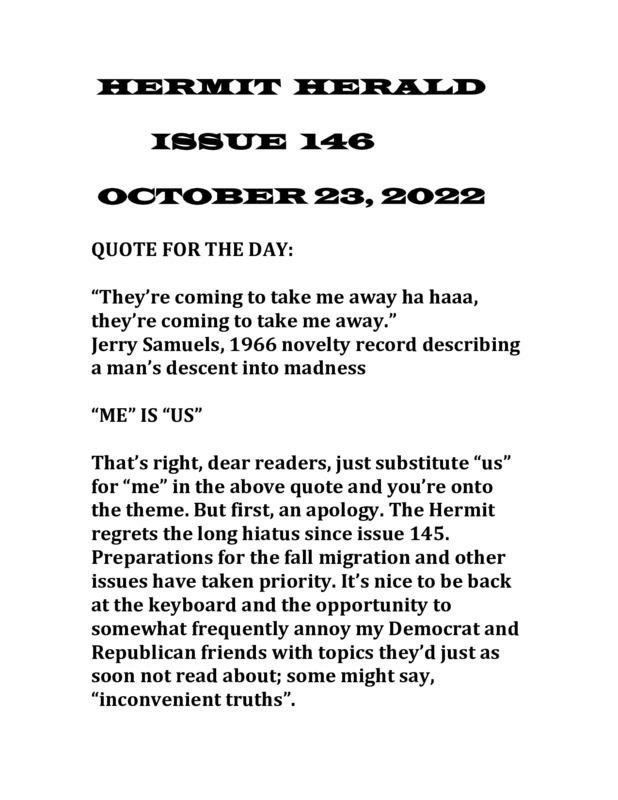 2022-10-23
2022-10-23HERMIT HERALD, ISSUE 146
DEMOCRACY AT RISK -
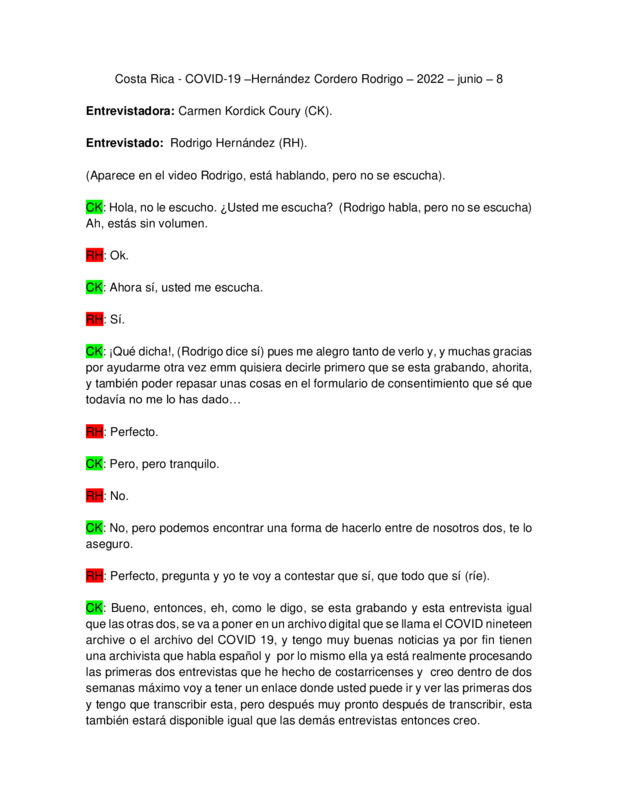 06/08/2022
06/08/2022Rodrigo Hernández Cordero Oral History, 2022/06/08
En esta entrevista Rodrigo Hernández Cordero es entrevistada por Carmen Kordick Coury concerniente al covid-19 en Costa Rica. Para empezar, hablaron de cosas que han cambiado desde el ano anterior. Hablaron de su negocio, inflación, y el gobierno. De allí hablaron del gobierno, la vacuna, y la mascarilla. Hablaron de La Caja, su vida social, y su familia. De las elecciones, fuentes principales de noticias y estudios cerebrales. Para terminar, hablaron de la juventud y de sus pensamientos del futuro. -
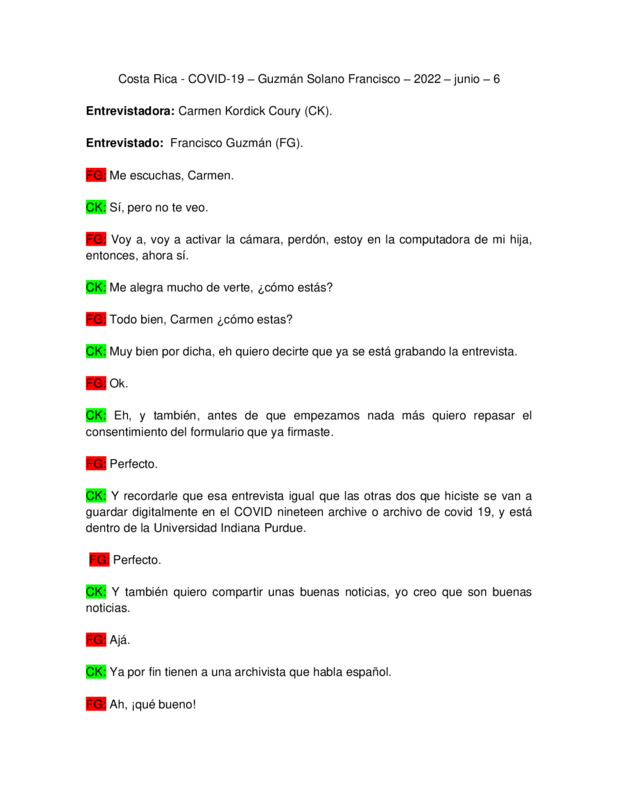 06/06/2022
06/06/2022Francisco Guzman Solano Oral History, 2022/06/06
En esta entrevista Francisco Guzman Solano es entrevistada por Carmen Kordick Coury concerniente al covid-19 en Costa Rica. Empiezan con los cambios que había pasado desde el ano anterior. Francisco habla de su familia y vida social. Hablan del uso de las máscaras, vacunas y la información falsa. De allí, hablan de la economía y la inflación, del gobierno y las elecciones. Hablan del crimen y las drogas. Para terminar, hablan de las fuentes principales de noticias y el futuro. -
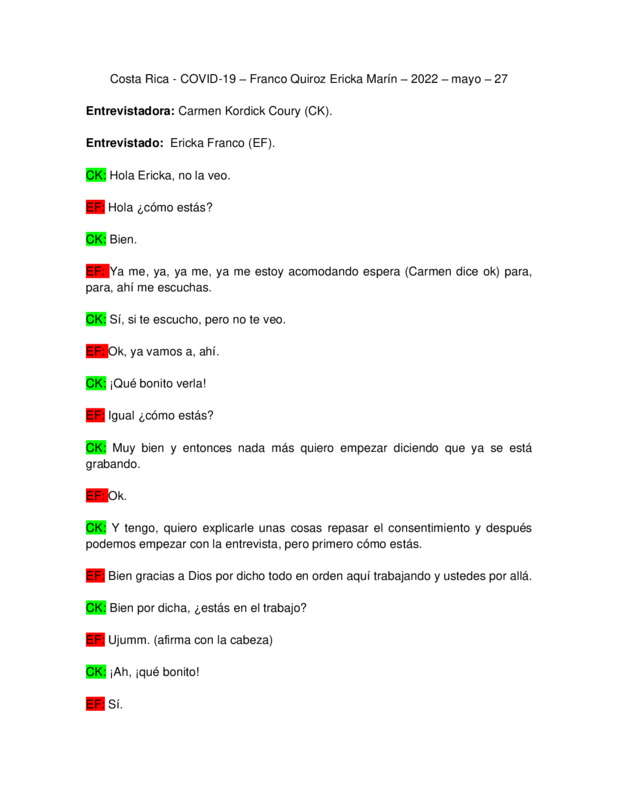 05/27/2022
05/27/2022Erika Franco Quirós Oral History, 2022/05/27
En esta entrevista Erika Franco Quirós es entrevistada por Carmen Kordick Coury concerniente al covid-19 en Costa Rica. Hablan de los cambios que habían pasado desde el año anterior y cuenta que ella empezó ir al trabajo presencialmente tiempo completo. Habla de las vacunas y mascarillas. Erika habla de su trabajo como orientadora para un colegio técnico profesional y también habla de los estudiantes. De allí, ella habla del gobierno, cuenta que ella contracto COVID, y habla de la gente que no se quiere vacunar. Habla de su vida social, fuentes de información donde ella se educa, y la economía. Para terminar, ella habla de las elecciones, salud mental y el futuro. -
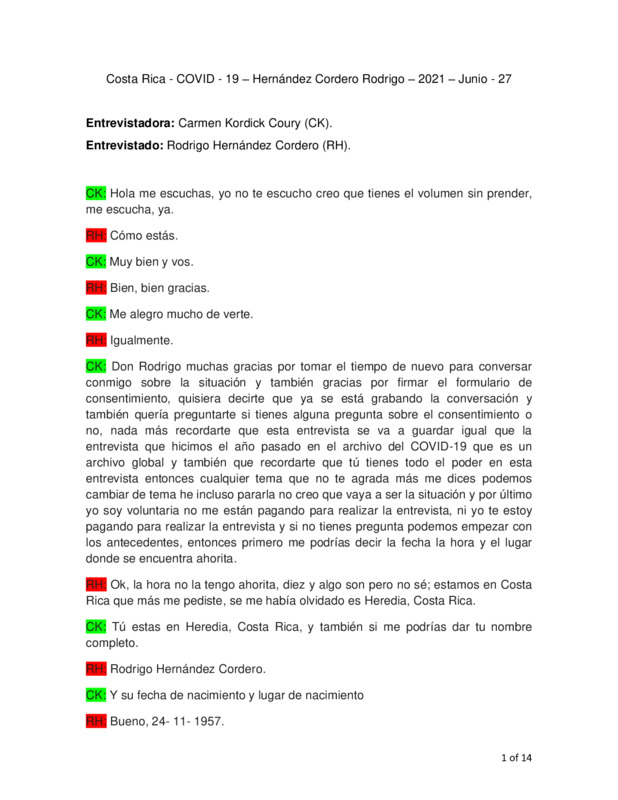 06/27/2021
06/27/2021Rodrigo Hernández Cordero Oral History, 2021/06/27
En esta entrevista Rodrigo Hernández Cordero es entrevistado por Carmen Kordick Coury concerniente al covid-19 en Costa Rica. Para empezar, hablaron de los cambios que pasaron desde el ano anterior. Rodrigo es dueño de tienda, hablan de su negocio, de las vacunas y de su deseo de no vacunarse. Hablan del gobierno, del uso de mascarillas y su familia. De allí, hablan de La Caja, el sistema médico y hospitales privados. Rodrigo habla de cruzando fronteras y comparando para su tienda. También de la corrupción del gobierno, vida familiar, salud mental y de los funerales. Para terminar, hablan de la esperanza para el futuro, fuentes principales de noticias y noticias falsas. -
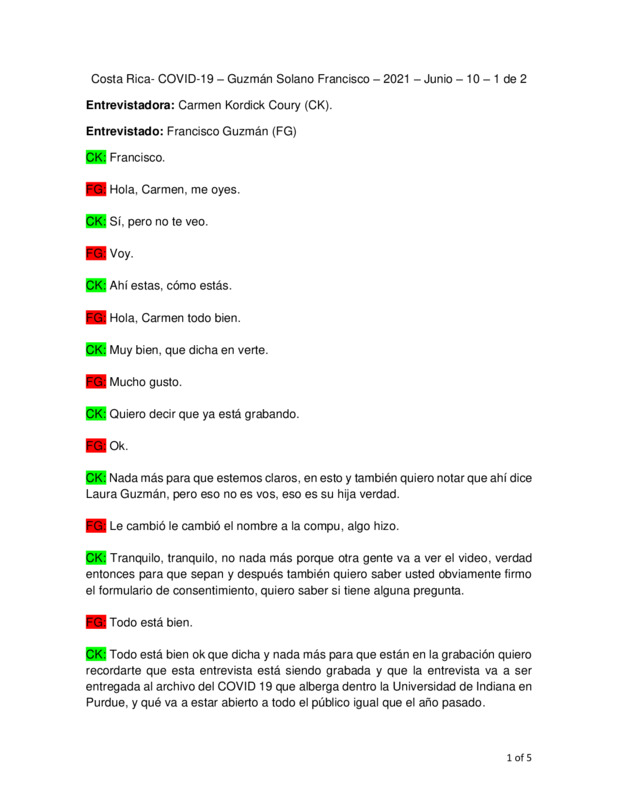 06/10/2021
06/10/2021Francisco Guzman Solano Oral History, 2021/06/21
En esta entrevista Francisco Guzman Solano es entrevistado por Carmen Kordick Coury concerniente al covid-19 en Costa Rica. Empiezan hablar de los cambios que Francisco ha visto desde el ano anterior. Hablan de la economía y el gobierno, de su trabajo y la vacuna. También hablan del aumento del crimen, de las drogas, y de las noticias falsas. De la Caja y el ministro de Salud. Francisco también habla de su familia y su hogar, de las fuentes principales de información y la sociedad. Terminan hablando de las clases virtuales de su hija, de la educación y del Ministerio de Educación. -
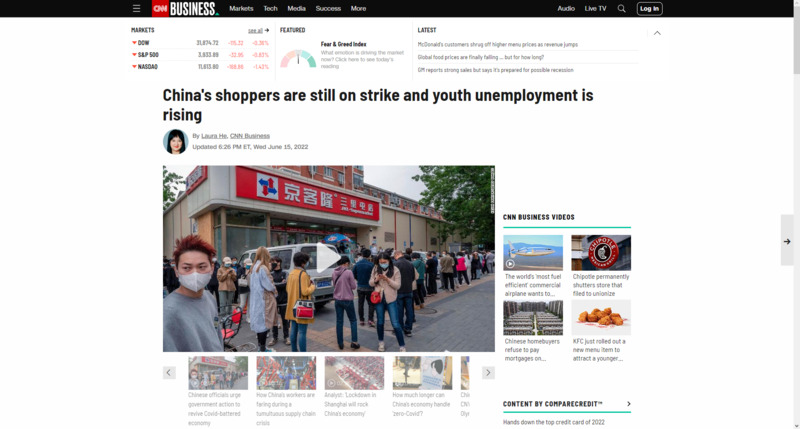 2022-06-15
2022-06-15China’s shoppers are still on strike and youth unemployment is rising
This is a news story from CNN by Laura He. This article is on the economic impact of China's zero COVID policy. Retail sales fell 6.7% in May according to China's National Bureau of Statistics. It is slightly lower than the 11. 1% drop in sales from April. Customer spending has fallen in about every category except for food, drink, and petroleum. Youth unemployment is rising in China, as places that would hire young workers were forced to shutdown with lockdowns. The youth unemployment rate rose 18.4% between the 16-24 range in China. -
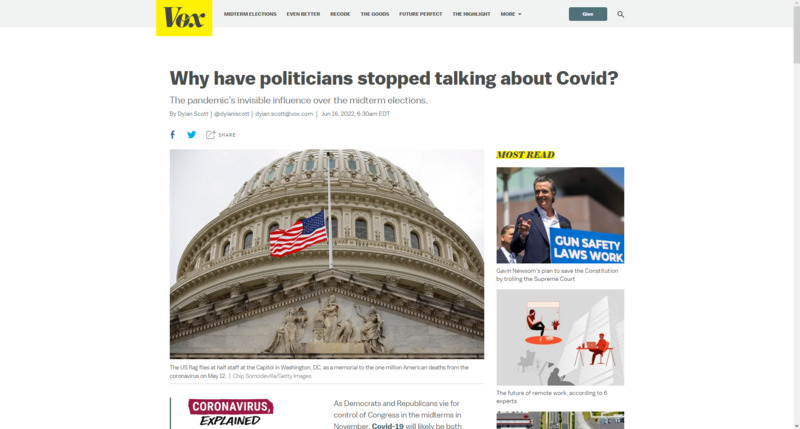 2022-06-16
2022-06-16Why have politicians stopped talking about Covid?
This is a text story from Vox by Dylan Scott. The article claims that COVID helped sink President Donald Trump's re-election campaign, yet despite this, it is not being focused on by either party. Though, this author believes the Democrat response hasn't been much better, with people not really touting President Joe Biden's vaccine rollout and other initiatives. The author links the reason for inflation being COVID interrupting supply lines, which is on people's minds for this midterm election. According to Gallup polling, COVID has lost importance in many people's minds, with it falling behind Russia and gas prices. On the Republican side of things, COVID is rarely mentioned, and if it is, it is in a negative light. Scott says that candidates favored by Donald Trump have gone against his ideas, with them being more skeptical of vaccines, and some refusing to get the vaccine at all. COVID is being tied to an anti-establishment attitude that has been rising within the Republican party. As for my own opinion on this piece, I believe that is does bring up an interesting point with linking COVID to current inflation. I do agree that COVID has impacted the economy for the worst with supply chains being more limited and rising spending of the federal government to counter it, but I do not think it can explain everything. Federal spending in general has been on an increase, which is driving up the cost of items, and not all that spending is COVID related. In addition to that, the shutdown of important pipelines has made reliance on foreign oil more of a necessity, which then drives up gas prices. These types of decisions can't all be traced back to COVID. So while I do think COVID has impacted the economy, I do not think it explains nearly all the economic issues the United States is facing. -
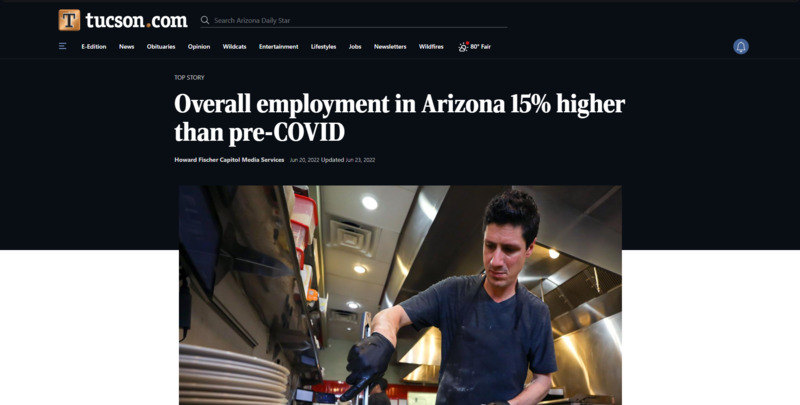 2022-06-16
2022-06-16Overall employment in Arizona 15% higher than pre-COVID
This is a news story from Tuscon.com. Overall, employment has risen by 15% compared to pre-COVID numbers. Bars, restaurants, and hotels have increased employment by 10.6% since last year. Permits issued for single and multi-family homes are down by about 16% compared to last year. There is also a 32.6% price increase on energy prices, being driven by rising gasoline prices. Overall, this article shows economic trends in Arizona and how COVID has impacted various industries and consumer trends. -
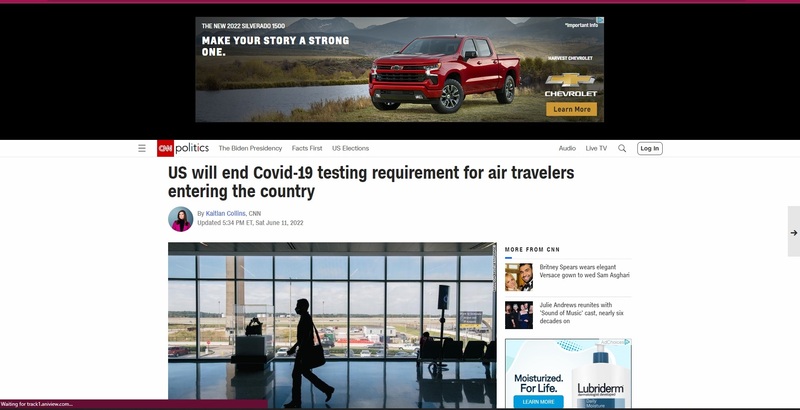 2022-06-11
2022-06-11US will end Covid-19 testing requirement for air travelers entering the country
This is a news story from CNN by Kaitlan Collins. The CDC is expected to lift the requirement for air travelers to test negative for COVID before entering the US. The travel industry has been lobbying the CDC for months regarding this issue after it was no longer determined that the restrictions are no longer "based on the science and data." However, just because it is getting lifted now, the CDC does have the power to reinstate this restriction if a new variant develops and causes concern. -
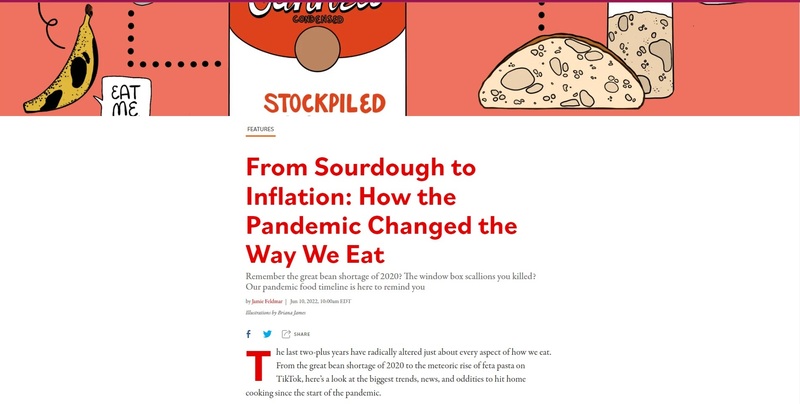 2022-06-10
2022-06-10From Sourdough to Inflation: How the Pandemic Changed the Way We Eat
This is a news story from Eater by Jamie Feldmar. This chronicles the changing food habits of people throughout the pandemic. In 2020, there was a wave of panic buying for things like flour, canned soups, and frozen vegetables. The use of grocery store delivery apps also increased that year. Instacart, a grocery delivery app, saw a 229% sales increase. With the panic buying came people looking for ways to use up things like canned goods and dried pasta. Things like sheet pan dinners, salads, and other easy meals became sought after in that time. Another change that occurred was people trying food trends popular during the pandemic. Things such as sourdough and whipped coffee were major food trends of that time. Meal kit delivery rose during the pandemic. Blue Apron had subscriptions to their food service skyrocket. Hello Fresh did as well, and was forced to close down temporarily to hire 3,000 extra workers to tackle the rising demand. In 2021, other food trends occurred while many restaurants and other dining establishments could not operate at full capacity. Things like espresso martinis and the dalgona candy, and candy made popular by the TV show Squid Game, were just some of those food trends. The food trends were not without labor issues though. In October 2021, Kellogg's workers went on strike, which affected the supply chains of that brand. Supply chain issues have become an ongoing problem since the beginning of the pandemic. In February 2022, the US temporarily shut down avocado imports from Mexico, making the food more expensive. With supply chain issues comes rising inflation. According to the USDA, food prices in 2022 were expected to rise between 6.5% to 7.5% increases. The Russian war with Ukraine cited as one of those causes. May 2022 saw a baby formula shortage, where 40% of baby formula was out of stock. Today, the USDA is looking to learn from the pandemic and the food issues that are occurring. One way they are doing this is through "a framework to transform the food system," which has the focus on building a more resilient supply chain while providing for rural and underserved communities. My own prediction is that the supply chain issues will mean more local food and less imported food overall in the United States. This means opening more food processing plants and increasing work domestically within the food industry to meet demands. The global food system is very fragile to things like pandemics and war. If food prices are to ever get lowered as well, it is important that more food gets produced and used locally. It would have the added benefit of being more environmentally friendly too, as the food would not have to be shipped as far away to where it gets used. -
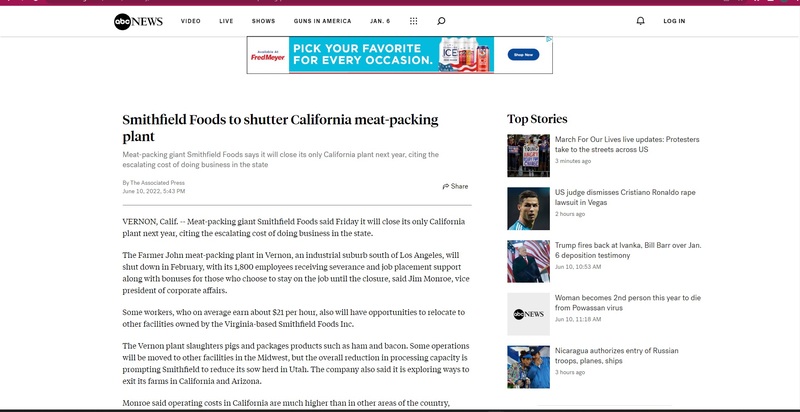 2022-06-10
2022-06-10Smithfield Foods to shutter California meat-packing plant
This is a news story from ABC News by The Associated Press. The shutdown of the Smithfield Foods plant in California is happening in part due to COVID. Some 300 employees were exposed to the virus in 2020, which created labor issues. Due to the exposure, California's Division of Occupational Safety and Health fined the company $60,000. -
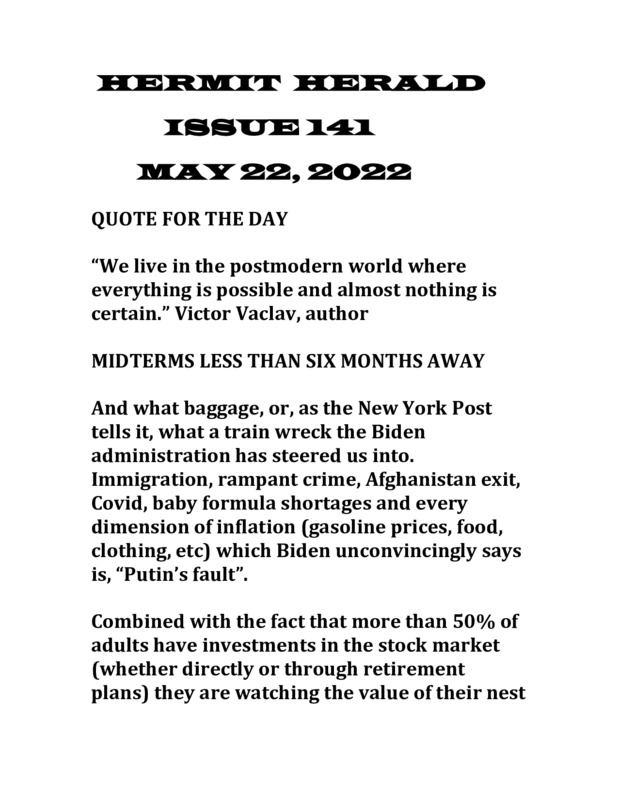 2022-05-22
2022-05-22HERMIT HERALD, ISSUE 141
Republican blowout at midterms? not so fast -
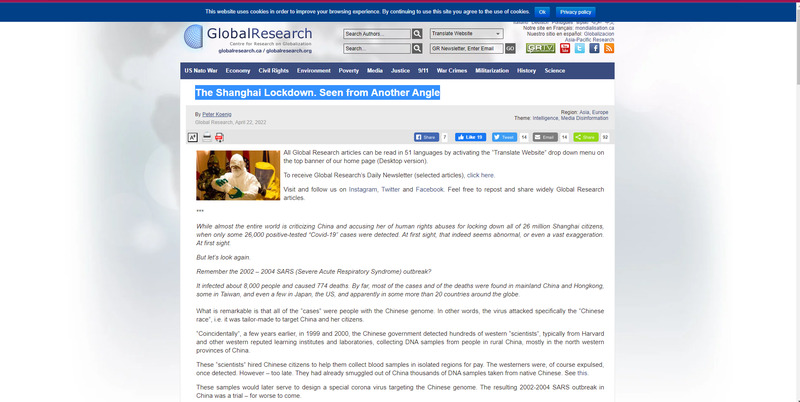 2022-04-22
2022-04-22The Shanghai Lockdown. Seen from Another Angle
This is a screenshot of an article from globalresearch.ca about looking at the most recent Shanghai Lockdown. Yet, the article does not talk about the Shanghai lockdown until maybe halfway through the article. It goes on a tirade about how the 2002-2004 SARS outbreak went after the "Chinese race" and how it became an early trial for China before COVID. Then the author states that China has "mastered the disease" and managed to reopen its economy by the end of 2020, which leads to the conclusion that China's economic growth hardly suffered during the newest outbreak. The author asserts that China will surpass the U.S. economy in 3-4 years and then launches into a world history lesson about Cold War politics. The author tends to wander in the article, going from pandemic skepticism on vaccines sterilizing women, being lied to the government, or having HIV ingredients. Then somehow, Ukraine has virus labs...I don't know. Somehow, Russia is involved in this article, but I'm not sure why. I don't know how this is supposed to persuade its audience because the author goes all over the place with his points. I suppose skeptics will like the fact that the vaccine is being questioned here? Personally, I don't even understand why skeptics would want to read this because I think they would lose even more brain cells from just trying to read it. I think this article is just a gigantic mess and it makes my brain hurt. I find myself just not understanding a single thing that is being written in this article. I don't understand why anyone would even understand or like this article. It literally makes absolutely no sense and there are even typos in it. The look of this website and article makes me want to run my virus protection at least three times because I feel like they're going to infect my computer with a Trojan horse. -
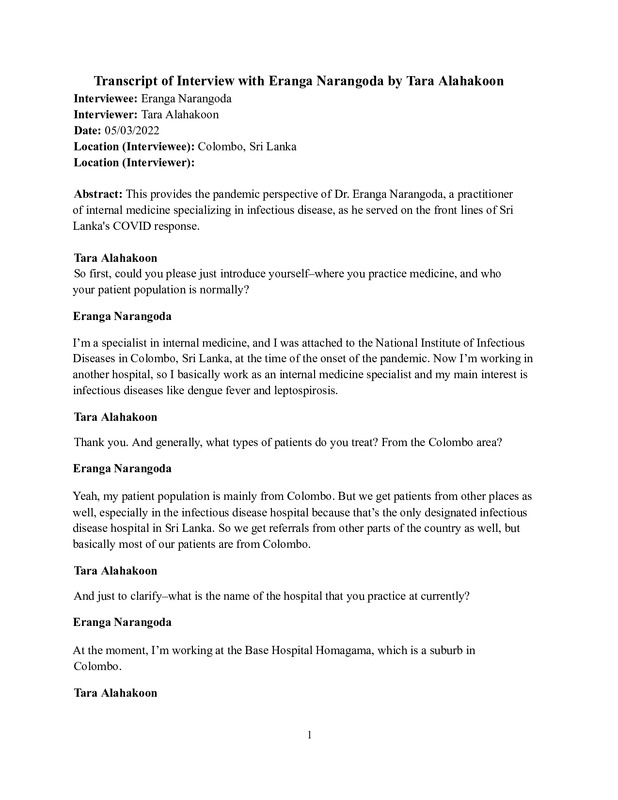 2022-05-03
2022-05-03Eranga Narangoda Oral History, 2022/05/03
It provides the pandemic perspective of Dr. Eranga Narangoda, a practitioner of internal medicine specializing in infectious disease, as he served on the front lines of Sri Lanka's COVID response. -
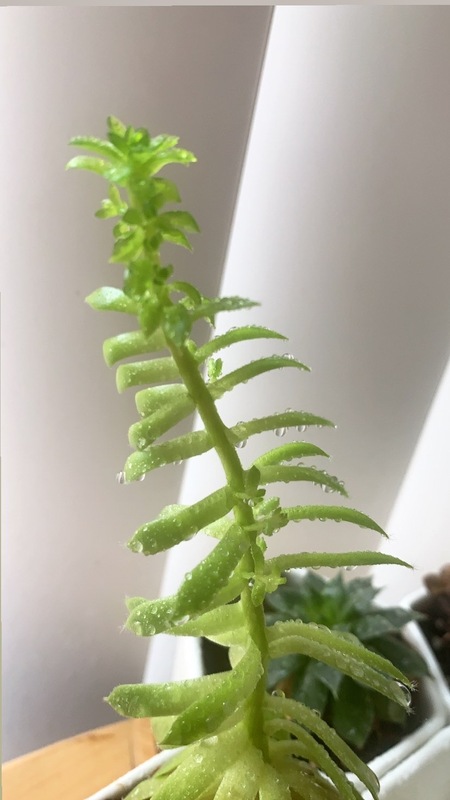 2020-03-18
2020-03-18All Things Will Pass
On this day, I recall watering my succulent and staring out the window with grave uncertainty of what was to come and utter confusion as to what exactly was happening. The stock market had just crashed andante pumped back up within minutes and the news was flooded with death and infection rates rising as people began clamoring for grocery stores to hoard supplies. The past two years living through COVID has felt somewhat like the process of the Calvin Cycle that kept my succulent in this photo nice and healthy. Although it is nearly impossible to articulate what life has been like or what was observed over the last two years, one great lesson I gained is the understanding that nothing is forever. It is all temporary. As I watered my plant with sheer emptiness and mentally checked-out due to the shock of the situation at the time, I began thinking about the Calvin Cycle process that my succulent or any plants outside would go through as my species was in dire panic. The world seemed to have stopped and sped up over night, but life itself remained to be what it was. Then the thought occurred to me. All things will pass. Living through COVID the last two years has seen work-from-home jobs rise to masses. I left one job to work at another and found that this was the worst comfort and behavior our species grew to become adapted to. For once, it has made us disconnected from reality and from each other. By being disconnected, it creates an issue of empathy and connection. The mantra of "connected while away," was shared everywhere when COVID first came about, but two years later, this has become the opposite. An example of this was observing many downplay the deaths of people from the virus, yet become very emotional once it was one of their family members. This could be viewed under a quick search on Google for the Reddit page of "Herman Cain Award." Bringing this page up primarily serves to show that both sides of the COVID discourse became contradictory as both sides were insensitive toward death. Was it due to being separated? I'll allow you to consider this. Another interesting point observed during COVID was the rise of irrational spending and mass speculation. Alan Greenspan once called the mass speculation a product of "Irrational Exuberance." The premise of this best serves that of investing as it describes the investor enthusiasm which drives asset prices higher than they are worth. However, the same could be viewed through the grocery hoarding of toilet paper or food where people became highly speculative of how long thee lockdowns would be. This was also indicative of the housing bubble 2.0 in which the Federal Reserve opened massive quantitative easing and opened cheap lines of credit for many. The result created more greed as people began hoarding one of the basic needs of our species in housing. How can a species feel righteous commoditizing shelter? The answer is irrational exuberance. Unfortunately, the result of the quantitative easing has created a massive issue where as the time I type this, the 1Q GDP results of the United States is at -1.4% and the inflation rate is at 8.5%. The Irrational Exuberance may be spelling the end of this decade's journey of cheap credit as it appears we are now headed for another Recession the next quarter. However, despite all of this irrational exuberance and the great stress these past two years have brought, I can no longer complain. I have adopted and accepted the Stoic philosophical belief that we must care for our neighbors as this will all pass. History has proven to be very biased when thinking in retrospect, but I hope my current peers use this to improve the future. ....... also, I never mentioned the protests, presidential change, food shortages in Sri Lanka and Peru, or how we have a dollar shortage crisis that nobody is talking about. All things will pass. -
2022-04-29
My Timewarp
It started for me when I returned from a business trip in Europe in March 2020. I had to fly through Germany to get home. Early in the pandemic a new country got added to the no-fly list. When I got back home, I went to work for a few days and then was told from my manager that Germany just got put on the list that if you have been there, you had to quarantine, so I couldn't come to work even though I had already been there for 3 days. So, I worked from home the rest of the week. The next week was spring break and I had it off anyway. We had plans to go to Disneyland. We decided to go and had a two-day pass. We went to the park Thursday and were resting Friday and planned to use our second pass the next day when we got notified through the Disney App that the next day would be the last day the park would be open. Almost 10 minutes later our church sent an email that services would be cancelled for the foreseeable future. My husband and I decided it was best to go home even though we still had a day at Disney. It was sinking in that this wasn’t just a few days of inconvenience. It was serious and we should head home. The next few months were hectic, scary, annoying and lonely. My son was in kindergarten and had to miss a lot of first milestones. School at home for a Kindergartner was a joke, but the time we got to spend time together as a family was nice. My work was accommodating and provided everything I needed at home. Two years later I am still working from home. I gained 15 pounds but I am back to what I was when this all started. Things are getting back to normal now, but inflation is insane and the supply chain is a nightmare. I spent some of the evening today searching for formula for my sister-in-law in Utah. A formula shortage. Something as vital as feeding babies is hard to find. Additionally, Russia invaded Ukraine just over a month ago, so even though the pandemic has settled down, the world hasn’t. God bless us. -
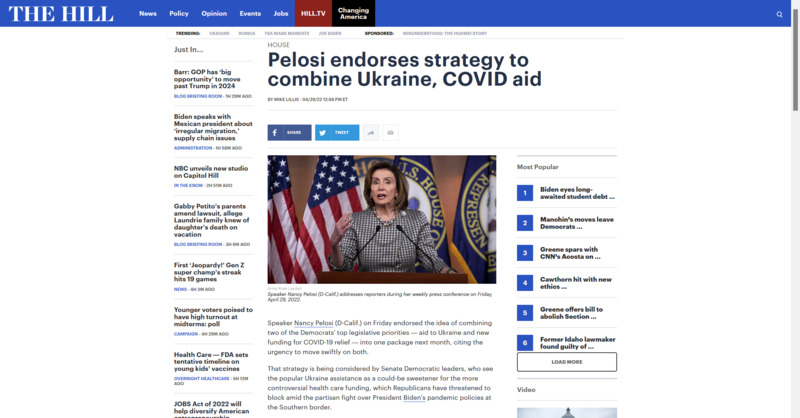 2022-04-29
2022-04-29Pelosi endorses strategy to combine Ukraine, COVID aid
This is a news story from The Hill by Mike Lillis. This is about House Speaker Nancy Pelosi combining COVID aid with Ukraine aid into one package. This strategy is intended to help Congress pass the spending needed for Ukraine for the war. Currently, the CDC has said that overall need for aid has diminished as cases keep going down, with more guidelines being removed. House Majority Leader Steny Hoyer (D-Md.) said the prospect that combining the two bills could delay them both is “a real consideration” that will likely influence the ultimate strategy. -
2020-03-01
Covid-19 Life
When covid first began, it did not have a huge impact on my life and the lives closest to me. The two week quarantine was more of a vacation rather than a punishment to me and my friends. However, as the months went by and I was the only one that had to go back to work due to being an "essential worker" while my friends did not was a blow to me personally. I continued to work 40 hour weeks and lost thousands of dollars monthly due to the low pay and being in a sales job. My friends were in the restaurant business so they continued to get unemployment and made more than me. This was a very annoying to me. I would never hold that against them since I would have done the same thing if given the opportunity. As time went on, it became a different type of annoyance from dealing with people who refused to wear a mask and gave constant issues to me and my coworkers. Our company had rules and while I had to wear the mask 8 hours a day, the customers did a fraction of that and still would constantly complain. I understand they can be annoying but it did not affect their breathing like they claimed. I had a couple compare themselves to Rosa Parks by "refusing to wear a mask to make a change" which got under my skin. The way the American government went about preventing covid was done in a terrible manner and I am extremely glad we are past the true heart of the pandemic. -
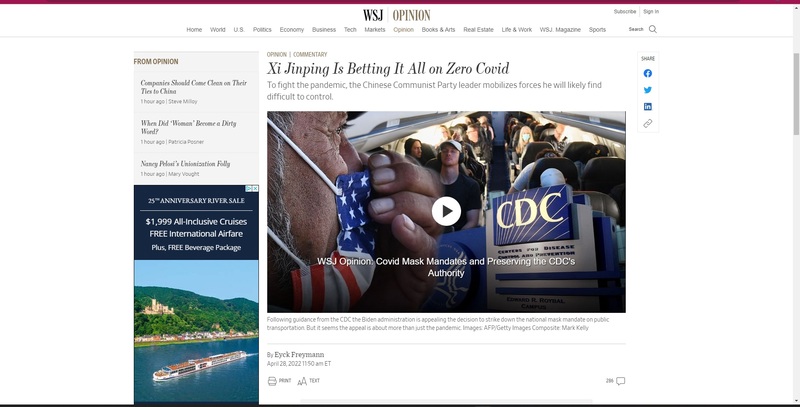 2022-04-28
2022-04-28Xi Jinping Is Betting It All on Zero Covid
This is a news story from The Wall Street Journal by Eyck Freymann. This article is about President Xi Jinping's zero COVID goal. The author argues that this is a risky move for President Xi, as enforcing a zero COVID policy could have many economic ramifications. As of Monday, 45 cities with 373 million people, representing 40% of China’s gross domestic product, were under partial or full lockdown, according to Nomura estimates. More cities and counties are under “static management,” a euphemism for quasi-lockdown. President Xi's COVID policy gets compared to Chairman Mao Zedong's Great Leap Forward, where it can start with a noble intention, but turn deadly for the population. Just like Mao faced great food shortages after the Great Leap Forward, locking down centers that produce a lot of the country's GDP is a risk too. -
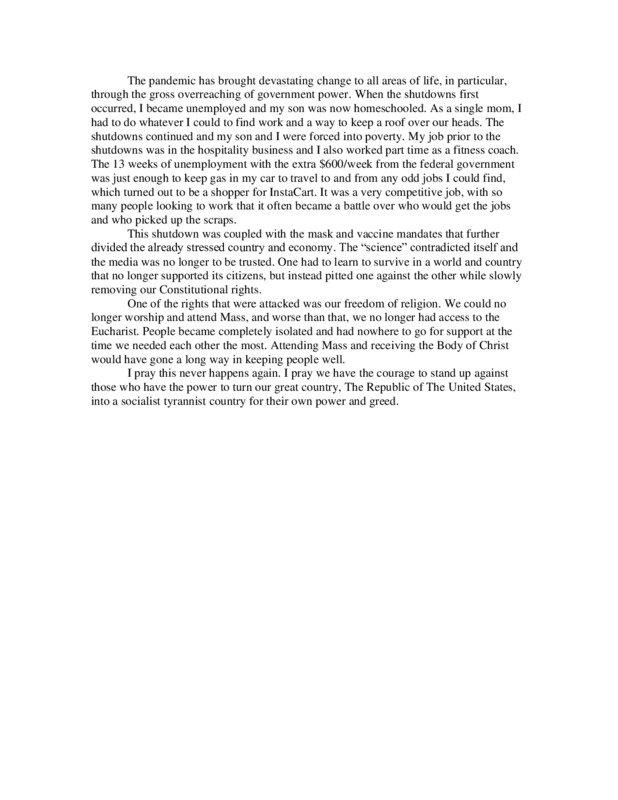 2022-04-27
2022-04-27Poverty and the Pandemic
My story touches on the importance of who holds the power over your life. Ultimately it is written to give an account to future generations so we never go back there again. -
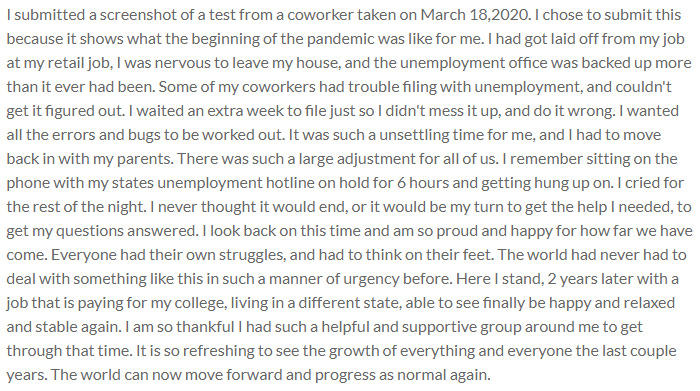 2019-03-17
2019-03-17My personal COVID 19 experience
I submitted a screenshot of a test from a coworker taken on March 18,2020. I chose to submit this because it shows what the beginning of the pandemic was like for me. I had got laid off from my job at my retail job, I was nervous to leave my house, and the unemployment office was backed up more than it ever had been. Some of my coworkers had trouble filing with unemployment, and couldn't get it figured out. I waited an extra week to file just so I didn't mess it up, and do it wrong. I wanted all the errors and bugs to be worked out. It was such a unsettling time for me, and I had to move back in with my parents. There was such a large adjustment for all of us. I remember sitting on the phone with my states unemployment hotline on hold for 6 hours and getting hung up on. I cried for the rest of the night. I never thought it would end, or it would be my turn to get the help I needed, to get my questions answered. I look back on this time and am so proud and happy for how far we have come. Everyone had their own struggles, and had to think on their feet. The world had never had to deal with something like this in such a manner of urgency before. Here I stand, 2 years later with a job that is paying for my college, living in a different state, able to see finally be happy and relaxed and stable again. I am so thankful I had such a helpful and supportive group around me to get through that time. It is so refreshing to see the growth of everything and everyone the last couple years. The world can now move forward and progress as normal again. -
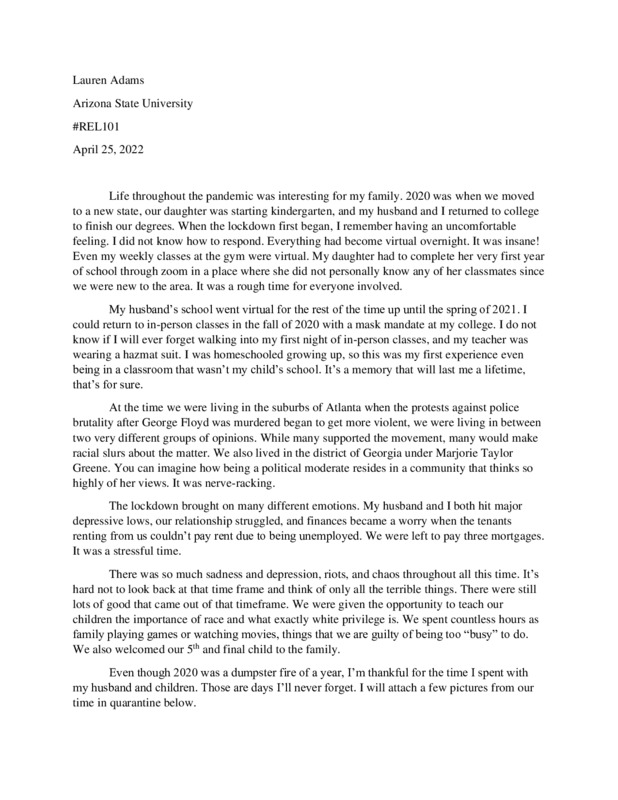 2022-04-25
2022-04-25COVID-19, Religion, and Public Life Reflection #REL101
this is a look through my point of view living in the year 2020 -
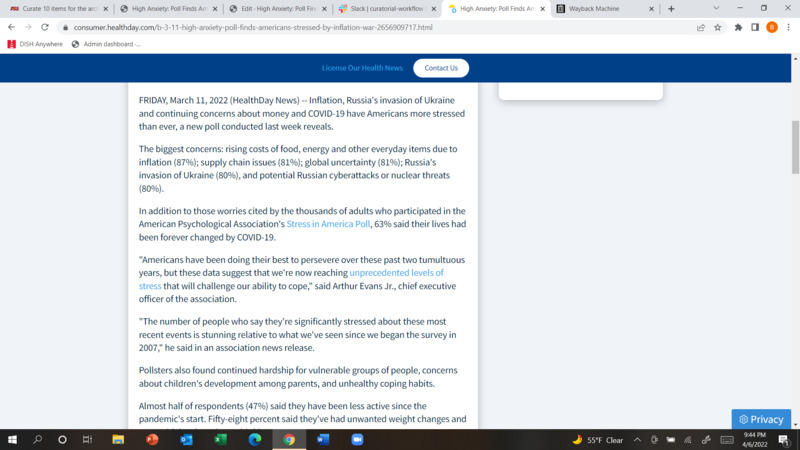 2022-03-11
2022-03-11High Anxiety: Poll Finds Americans Stressed by Inflation, War
This is a news story from Health Day by Robert Preidt. This is about a poll on what is making Americans most anxious. War, COVID-19, and inflation are at the top of what is making Americans feel anxious. Another thing the poll tells is that 63% percent said their lives changed forever due to COVID-19. 47% of people that took this poll also said that they have become less active compared to pre-pandemic. 58% said they had unwanted weight changes. Among those that gained more weight than they wanted, the average weight gain reported was 26 pounds. Others have said that the separation from others has put strain on relationships, or ended them. The APA reports that those with reduced social support are more likely to cope with stress. 56% say they could have used more emotional support during the pandemic. This poll had 3,012 respondents in February, and 2,051 from March 1-3. -
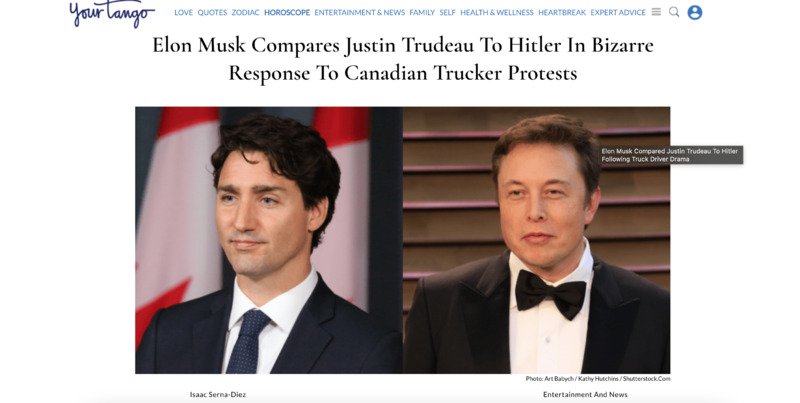 2022-02-17
2022-02-17Elon Musk Compares Justin Trudeau To Hitler In Bizarre Response To Canadian Trucker Protests
This is a news story from Your Tango by Isaac Serna-Diez. This is about a Twitter rant, where Elon Musk, owner of Tesla, compares Prime Minister Justin Trudeau to Adolf Hitler over the Canadian Trucker Protests. In January, both the United States and Canada imposed vaccine mandates. According to the American Trucking Association, only 50-60% of all truckers are vaccinated. The truckers have created a convoy that blocks traffic across the US-Canada border in response to the mandates. Trudeau's response to this was to invoke the Emergencies Act, which has't been used since 1988. The Emergencies Act allows for freezing of bank accounts and funds in order to take money away from those protesting. These freezes would also impact things like GoFundMe and the ability to raise funds from that site. It also allows for military involvement, but Trudeau says that he has no plans of doing so. Musk's response to what Trudeau imposed economically on protesters prompted him to promote cryptocurrency more. -
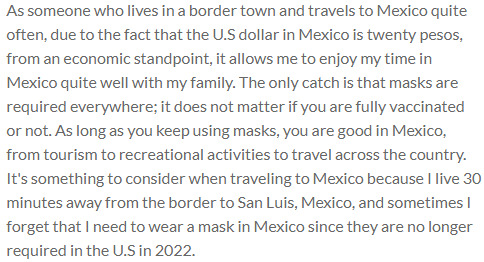 2022-04-05
2022-04-05Masks are still required in Mexico
As someone who lives in a border town and travels to Mexico quite often, due to the fact that the U.S dollar in Mexico is twenty pesos, from an economic standpoint, it allows me to enjoy my time in Mexico quite well with my family. The only catch is that masks are required everywhere; it does not matter if you are fully vaccinated or not. As long as you keep using masks, you are good in Mexico, from tourism to recreational activities to travel across the country. It's something to consider when traveling to Mexico because I live 30 minutes away from the border to San Luis, Mexico, and sometimes I forget that I need to wear a mask in Mexico since they are no longer required in the U.S in 2022. -
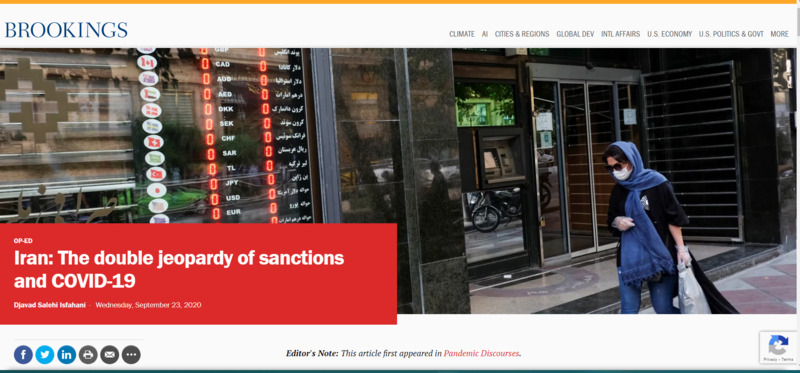 2020-09-23
2020-09-23Iran: The double jeopardy of sanctions and COVID-19
This article discusses the effects of Covid-19 on Iran and how the sanctions imposed on Iran by the Trump administration exacerbated Covid’s effect on Iran’s already weak economy. It highlights Iran’s attempts to reduce the fatality rate despite a shortage of medical supplies. Additionally, the article posits that lifting sanctions during the pandemic might have reduced the death toll by thousands. While there is speculation that the true number of Covid deaths in Iran has been reduced and even misreported, this article highlights the connection between U.S. politics and the effects of sanctions imposed on countries during a public health crisis. -
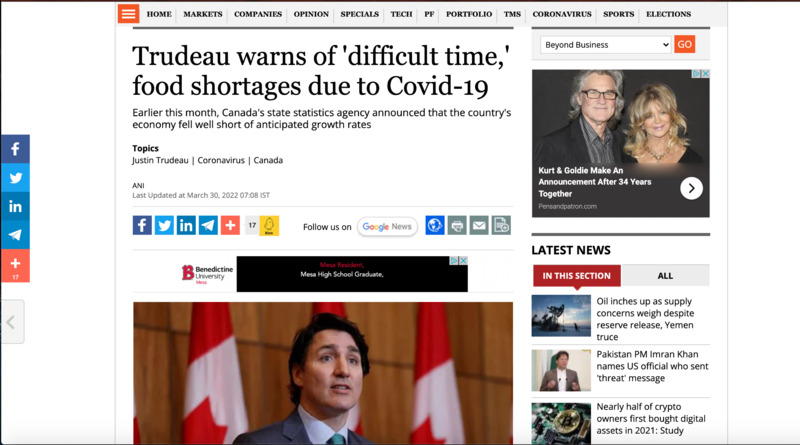 2022-03-30
2022-03-30Trudeau warns of 'difficult time,' food shortages due to Covid-19
This is a news story from the Business Standard. This is about the after effects of COVID on the Canadian population. Prime Minister Justin Trudeau warns that it will be a difficult time with food shortages due to COVID. Some of the blame for the food shortages is also placed on Russia's invasion of Ukraine. Similar tactics of blaming President Vladimir Putin for the rising prices of goods has also been used by President Joe Biden. The global disruption of supply chains results in higher prices of necessities. Earlier in March, the Canadian government announced that the economy fell short of its anticipated growth for that month. In February, inflation in Canada rose by 5.7%, the highest increase since August 1991. -
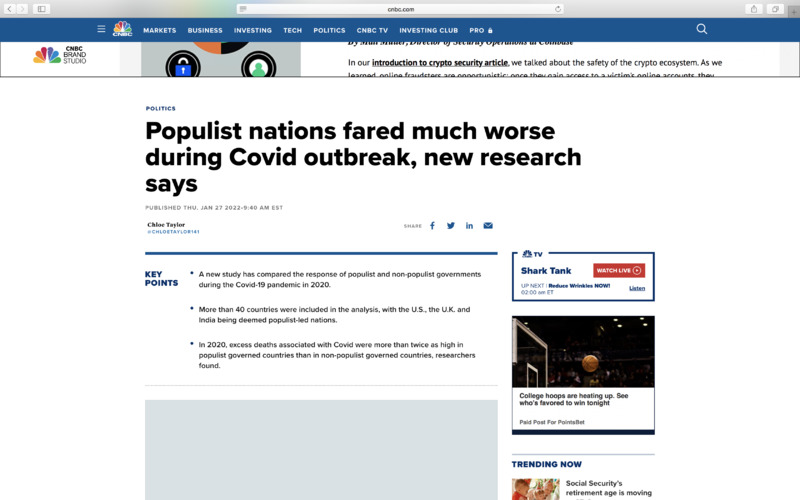 2022-01-27
2022-01-27Populist nations fared much worse during Covid outbreak, new research says
This is a news story from CNBC, written by Chloe Taylor. This is a story about a study that came out about how well populist nations fared under COVID-19 compared to other nations around the world. More than 40 countries were included in this study, with the US, UK, and India being considered populist nations at the time that this was conducted. In 2020, the study claims that excess deaths were more than twice as high for populist ran governments. For comparison, the countries that were not considered populist in this study include Canada, Sweden, and Japan. For every 100 COVID related deaths, non-populist countries had an additional 8 deaths. In populist led countries, it was an additional 18 deaths for every 100 deaths. The study attributes this to higher citizen mobility that was allowed in populist nations, leading to more spread of the virus. It also claims that populist governments downplayed the severity of the virus itself, giving people the impression that things were safer than they actually were. -
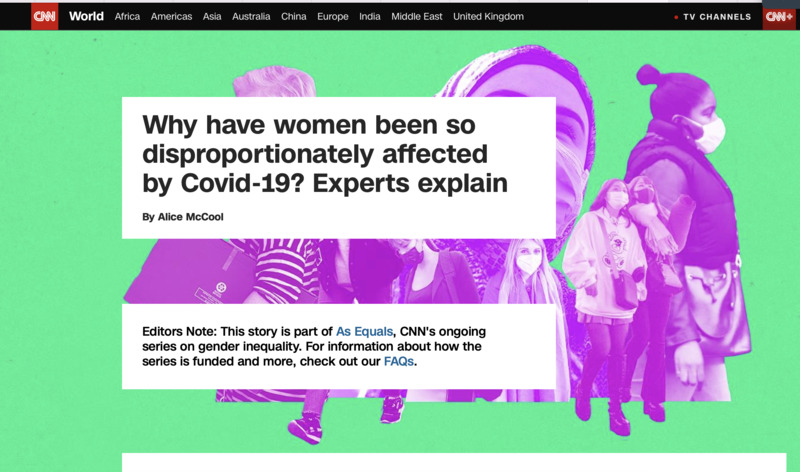 2022-03-10
2022-03-10Why have women been so disproportionately affected by Covid-19? Experts explain
This is a news story from CNN by Alice McCool. This story talks about the inequalities women have faced during COVID-19. In a CNN poll, women in the G7 countries (US, UK, France, Germany, Canada, Japan, and Italy) felt less supported by their leaders than men did. Some of these inequalities include women being more likely to lose their jobs or take on more uncompensated care work. Other things, such as abortion services, were considered non-essential in some countries during COVID. Minority women and poor women were also more likely to work low-paying jobs and bear much of the economic strain. Additionally, trans healthcare was also viewed as non-essential in many places. In places like Uganda, many women lost their safety net provided from schools, resulting in rising teen pregnancies and early marriages. This article continues showing more examples of the hoops women had to jump through compared to men and demonstrates the social issues that got worse as a result from COVID lockdowns. -
 2020-04-20
2020-04-20Stacking Refrigerators: A Pandemic Work Story
This image is of me working at a refrigerator plant during the Spring of 2021. Before I started working at my law firm, I bounced around and did odd jobs to make ends meet. I came across this plant job in my hometown because the plant was suffering from severe labor shortages due to COVID-19. The plant was offering higher pay due to labor shortages and was offering to hire in employees faster because of it. We were required to wear mask inside the plant at all times regardless of it being extremely hot and were expected to do overtime and come in on weekends if needed. I did not only want to highlight the work conditions of this job but illuminate businesses began to operate due to the dire conditions of the pandemic. I also wanted to highlight how some people had to continue to work during the pandemic despite setbacks with workers, production numbers, and work conditions. It is important to illuminate stories like these because many essential workers stories are not heard and recognized. Despite unemployment numbers being at all-time high nationally, people are still working. Therefore, it is important to recognize the sacrifices and contributions workers like I had to make in order to continue to support ourselves and our loved ones. -
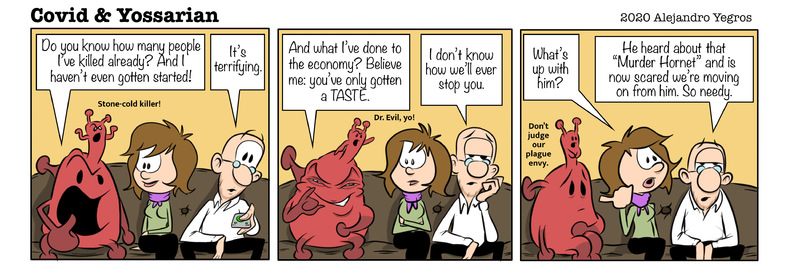 2020-05-06
2020-05-06Murder Hornet is in the air
A comic strip about Covid-19 -
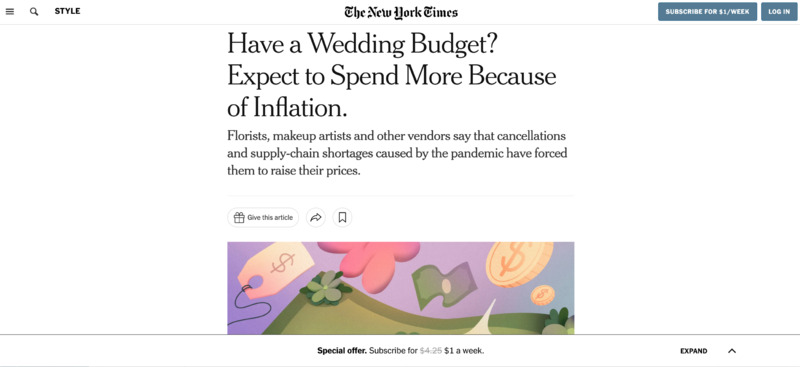 2022-03-30
2022-03-30Have a Wedding Budget? Expect to Spend More Because of Inflation
This story from the New York Times by Danielle Braff talks about the rising costs of weddings as a result from COVID. Couples mentioned in this story go on about how just the basics are more expensive than they used to be. Ms. Alvear-Beceiro and Mr. Klebba, despite not spending extra on things like food, decorations, and music, had a wedding budget that topped $30,000. Zola, a wedding planning site, said that a third of the 468 participating vendors had losses of $50,000 or more due to couples postponing weddings in 2020. Supply chain shortages later on have also helped increase the overall costs, and many businesses are still trying to operate to pre-pandemic levels. Due to rising costs, some couples are choosing to scale back the festivities. Shannon Bernadin, after looking at the costs of wedding venues with her husband, decided to have a wedding at a friend's house and use thrifted outfits, along with homemade decor. All in all, this article demonstrates the changing economy and how that has impacted the wedding industry and how people plan weddings. -
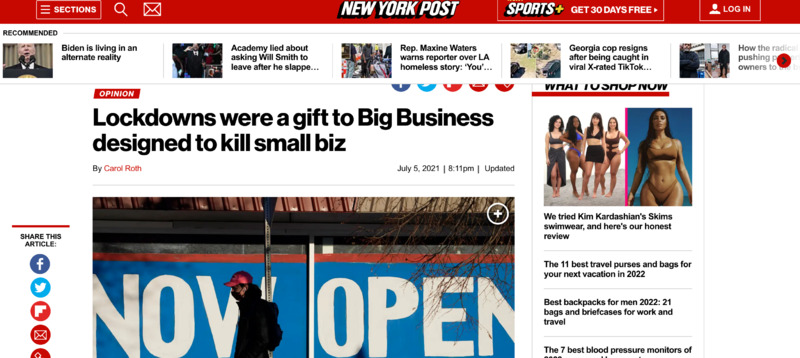 2021-07-05
2021-07-05Lockdowns Were a Gift to Big Business Designed to Kill Small Biz
This is an opinion piece by Carol Roth for the New York Post. This news story is about ways in which the lockdowns in 2020/2021 hurt small businesses, but helped big businesses. Roth claims that during the pandemic, small businesses are hitting half or less than half of their pre-lockdown revenue. Some businesses, Roth claims, possibly won’t recover at all. This article says that in 2020, the Hamilton Project accounted for 400,000 closures. I find this article to be important, as I think the business side of the pandemic needs to be told more, as these effects on small businesses impact the local and state economies, in addition to what jobs are available for people looking to go back to work after lockdowns end. -
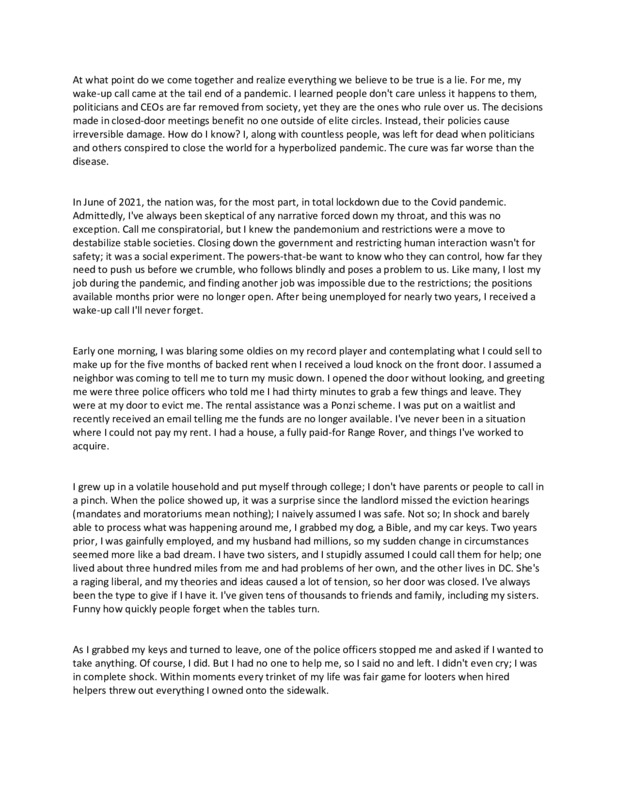 2022-03-28T08:40
2022-03-28T08:40Covid the Great Destabilizer
My personal experience -
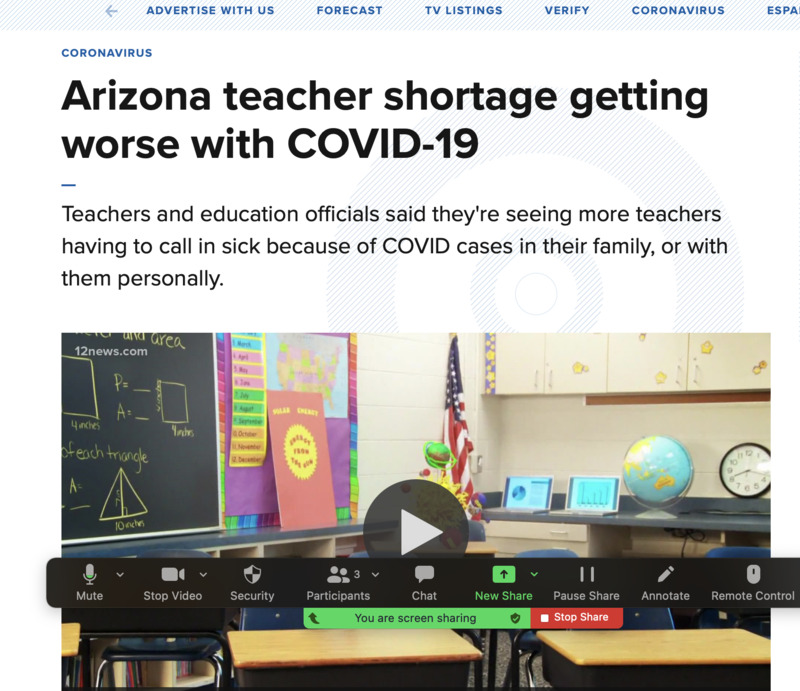 2022-01-11
2022-01-11Arizona teacher shortage getting worse with COVID-19
Arizona teachers have struggled with obtaining higher pay and better funding for years. Add to that a legislative body that doesn’t prioritize educational funding, improving teaching conditions or student learning. When Covid-19 reared its ugly head, the pressure public school teachers normally deal with in overcrowded, undersupplied classrooms intensified and – for many overworked teachers – this was the last straw. Teachers who were in a position to took early retirement. Others simply left the profession for the private sector. Still, some remained and adapted to whatever model of learning their school district employed – sometimes on a week-to-week basis. Now that most schools have returned to an in-person modality, teachers are still leaving the classroom. This article sheds lights on the teacher shortage and how, even still, Arizona educators are contending with Covid-19 in their classrooms and families, leading them to reconsider their decision to stay in education. -
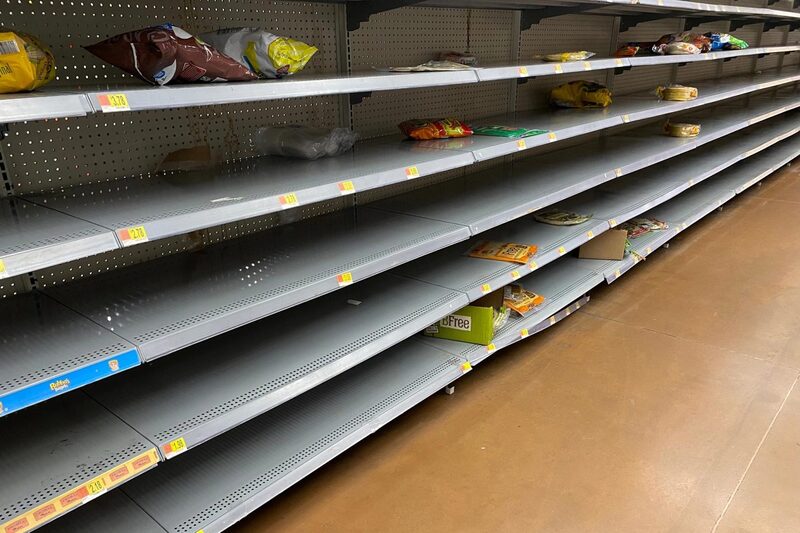 2020-03
2020-03empty shelves
My plaque story begins in March 2020, right in the middle of my senior year of my senior year of high school. that day we were let out of school for, what we were told, 2 weeks. One of my friends was away at a baseball camp that night and he had left his car in our school parking lot so me and my friends decided to go to the grocery store, buy a bunch of Saran Wrap, and Saran Wrap his car. At this point the amount that the pandemic would affect our lives hadn't sank in yet but when we got to the grocery store to buy the wrap we saw a very surreal sight. Hundreds of people were there wearing masks and gloves, and even goggles. People were buying canned food and toilet paper in mass quantities and there were numerous empty shelves. It looked like something out of a movie and that's when it began to sink in how crazy the situation was. that same week I remember going hiking with a couple of my friends and talking about the pandemic. I remember us wondering if anyone that we knew would end up getting the virus or if it would fizzle out before it hit Pennsylvania and if or when we would go back to school to finish our senior year. It turned out that we would never go back and "two weeks to slow the spread" turned into months and then years. It is now February 2022 and our lives are still being turned upside down by this pandemic. All we can do now is hope that things eventually return to normal and that we as humans can learn from the mistakes made during this pandemic. -
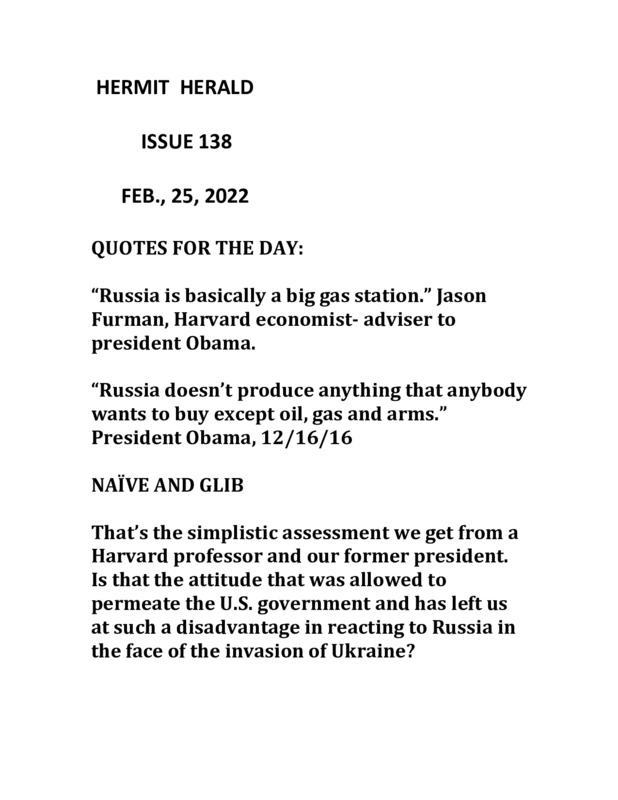 2022-02-25
2022-02-25hermit HERALD, ISSUE 138
Russia, more powerful than thought -
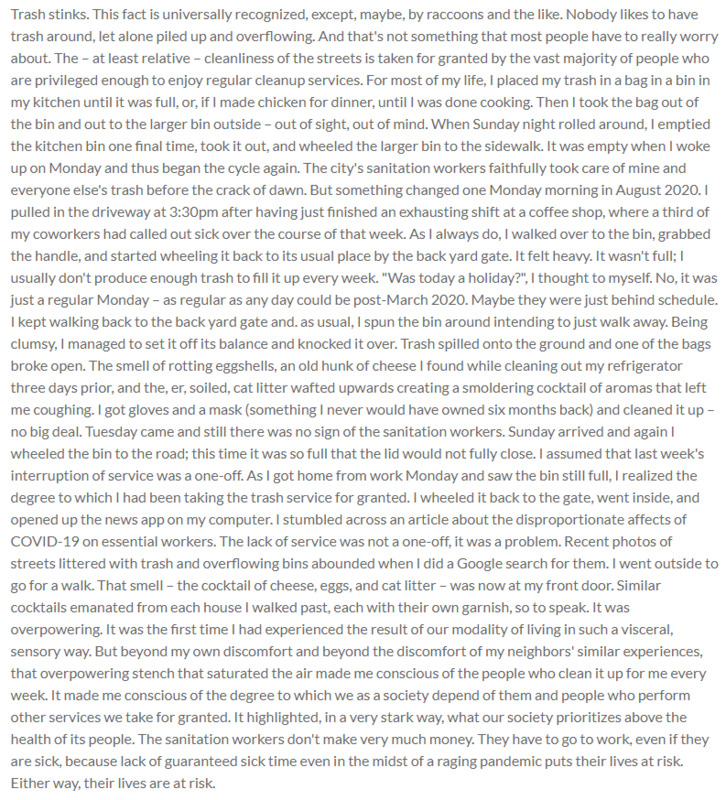 2020-08-10
2020-08-10Smelling the labor shortage
Trash stinks. This fact is universally recognized, except, maybe, by raccoons and the like. Nobody likes to have trash around, let alone piled up and overflowing. And that's not something that most people have to really worry about. The – at least relative – cleanliness of the streets is taken for granted by the vast majority of people who are privileged enough to enjoy regular cleanup services. For most of my life, I placed my trash in a bag in a bin in my kitchen until it was full, or, if I made chicken for dinner, until I was done cooking. Then I took the bag out of the bin and out to the larger bin outside – out of sight, out of mind. When Sunday night rolled around, I emptied the kitchen bin one final time, took it out, and wheeled the larger bin to the sidewalk. It was empty when I woke up on Monday and thus began the cycle again. The city's sanitation workers faithfully took care of mine and everyone else's trash before the crack of dawn. But something changed one Monday morning in August 2020. I pulled in the driveway at 3:30pm after having just finished an exhausting shift at a coffee shop, where a third of my coworkers had called out sick over the course of that week. As I always do, I walked over to the bin, grabbed the handle, and started wheeling it back to its usual place by the back yard gate. It felt heavy. It wasn't full; I usually don't produce enough trash to fill it up every week. "Was today a holiday?", I thought to myself. No, it was just a regular Monday – as regular as any day could be post-March 2020. Maybe they were just behind schedule. I kept walking back to the back yard gate and. as usual, I spun the bin around intending to just walk away. Being clumsy, I managed to set it off its balance and knocked it over. Trash spilled onto the ground and one of the bags broke open. The smell of rotting eggshells, an old hunk of cheese I found while cleaning out my refrigerator three days prior, and the, er, soiled, cat litter wafted upwards creating a smoldering cocktail of aromas that left me coughing. I got gloves and a mask (something I never would have owned six months back) and cleaned it up – no big deal. Tuesday came and still there was no sign of the sanitation workers. Sunday arrived and again I wheeled the bin to the road; this time it was so full that the lid would not fully close. I assumed that last week's interruption of service was a one-off. As I got home from work Monday and saw the bin still full, I realized the degree to which I had been taking the trash service for granted. I wheeled it back to the gate, went inside, and opened up the news app on my computer. I stumbled across an article about the disproportionate affects of COVID-19 on essential workers. The lack of service was not a one-off, it was a problem. Recent photos of streets littered with trash and overflowing bins abounded when I did a Google search for them. I went outside to go for a walk. That smell – the cocktail of cheese, eggs, and cat litter – was now at my front door. Similar cocktails emanated from each house I walked past, each with their own garnish, so to speak. It was overpowering. It was the first time I had experienced the result of our modality of living in such a visceral, sensory way. But beyond my own discomfort and beyond the discomfort of my neighbors' similar experiences, that overpowering stench that saturated the air made me conscious of the people who clean it up for me every week. It made me conscious of the degree to which we as a society depend of them and people who perform other services we take for granted. It highlighted, in a very stark way, what our society prioritizes above the health of its people. The sanitation workers don't make very much money. They have to go to work, even if they are sick, because lack of guaranteed sick time even in the midst of a raging pandemic puts their lives at risk. Either way, their lives are at risk. -
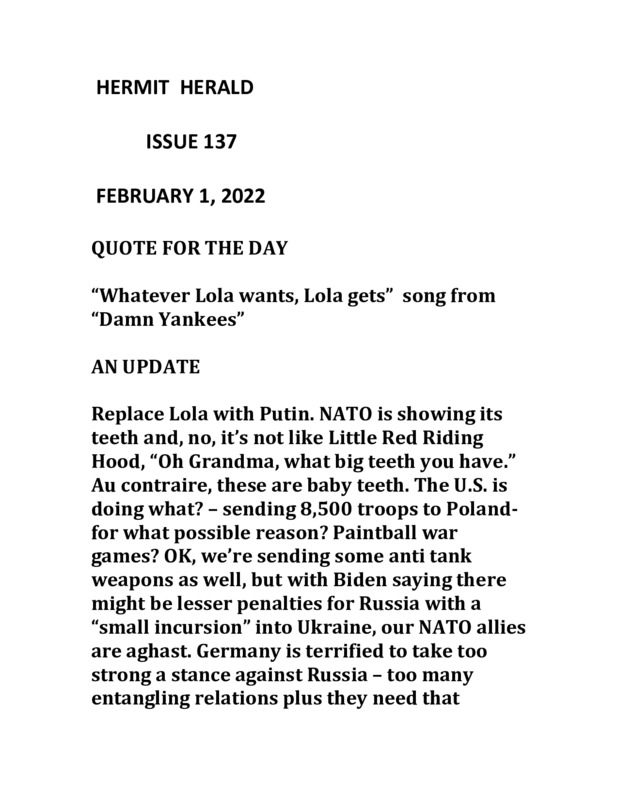 2022-02-01
2022-02-01hermit HERALD, ISSUE 137
Putin vs NATO -
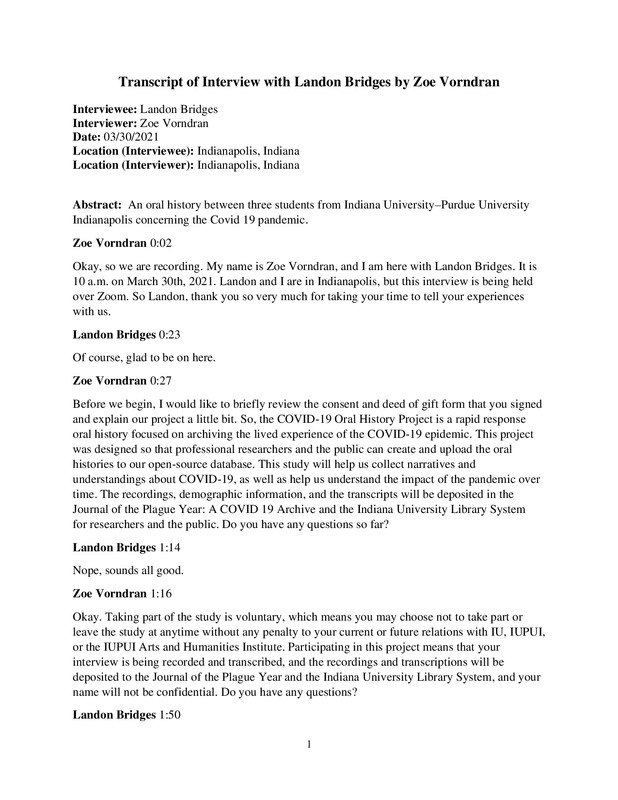 03/30/2021
03/30/2021Landon Bridges Oral History, 2021/03/30
An oral history between three students from Indiana University–Purdue University Indianapolis concerning the Covid 19 pandemic -
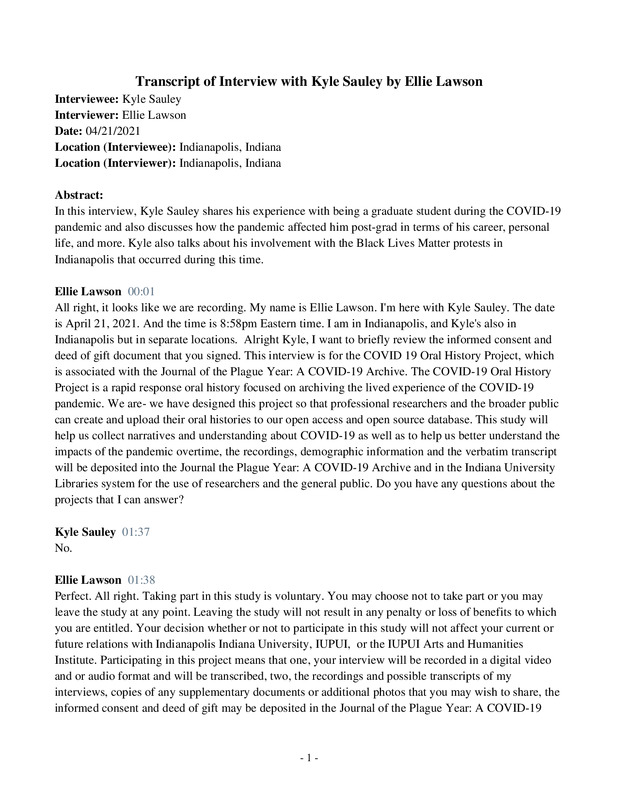 05/03/2021
05/03/2021Kyle Sauley Oral History, 2021/05/03
-
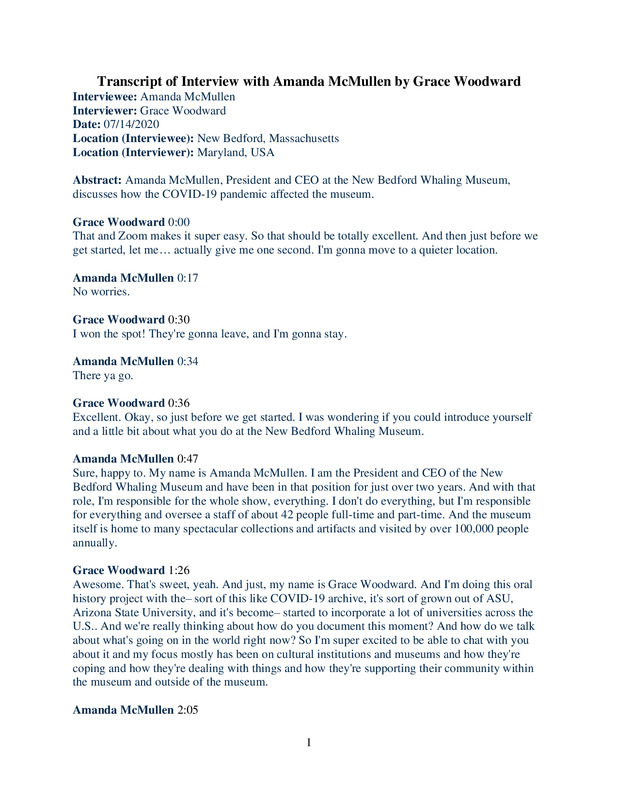 07/14/2020
07/14/2020Amanda McMullen Oral History, 2020/07/14
C19OH -
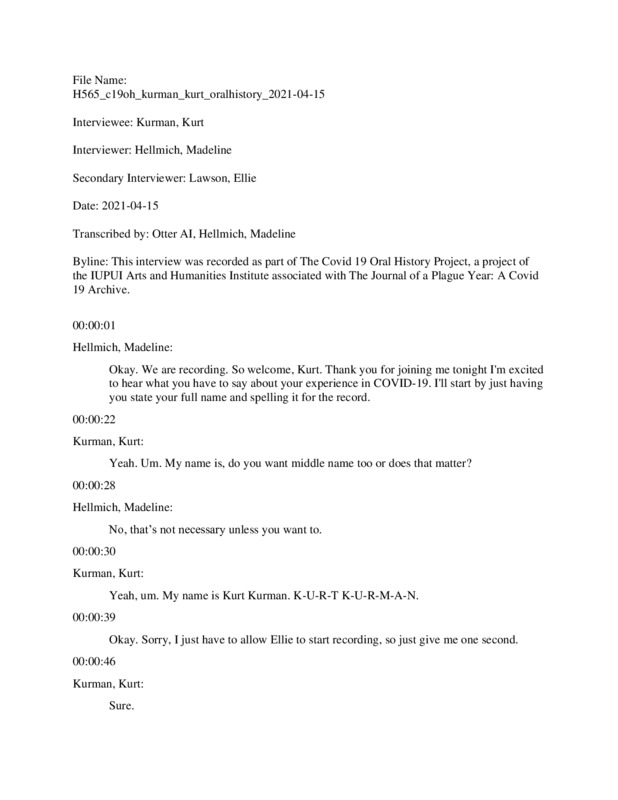 04/15/2021
04/15/2021Kurt Kurman Oral History, 2021/04/15
-
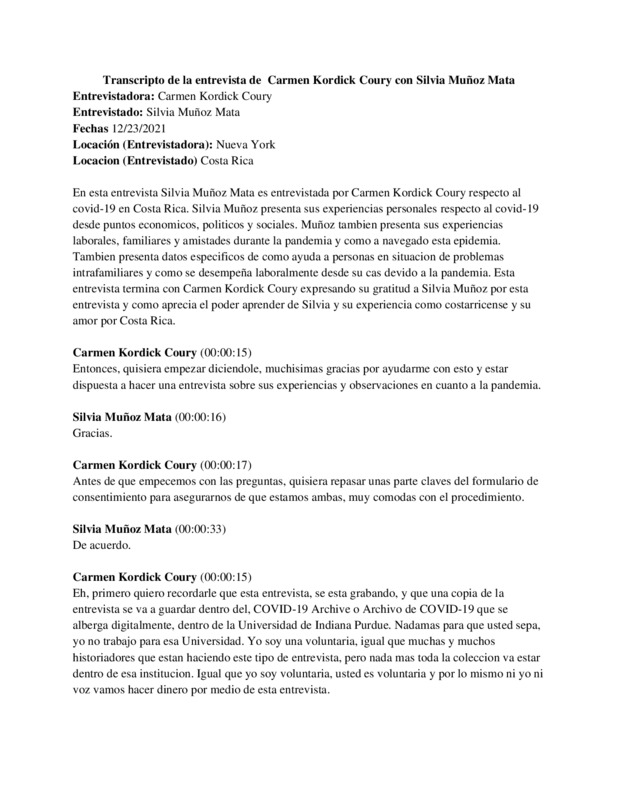 05/01/2020
05/01/2020Silvia Muñoz Mata Oral History, 2020/05/01
En esta entrevista Silvia Muñoz Mata es entrevistada por Carmen Kordick Coury concerniente al covid-19 en Costa Rica. Silvia Muñoz tiene 45 años y vive en Heredia. Ella presenta sus experiencias personales sobre la pandemia del covid-19 desde puntos económicos, políticos y sociales. Silvia también presenta sus experiencias laborales, familiares y amistades durante la pandemia y como ha navegado está epidemia. Ella presenta datos específicos de cómo ayuda a personas en situación de problemas intrafamiliares y como se desempeña laboralmente desde su casa devido a la pandemia. Esta entrevista termina con Carmen Kordick Coury expresando su gratitud a Silvia Muñoz por esta entrevista y como aprecia el poder aprender de Silvia y su experiencia como costarricense y su amor por Costa Rica.
